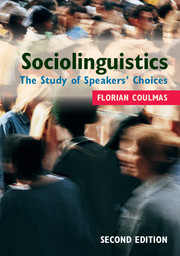1 - Introduction: notions of language
Published online by Cambridge University Press: 05 August 2013
Summary
Reality does not speak to us objectively, and no scientist can be free from constraints of psyche and society.
Stephen Jay Gould (2000)Outline of the chapter
After considering the twofold nature of language as a natural and a social object of study, this introductory chapter explains the position of sociolinguistics in the language sciences. It then discusses some general implications of the fact that languages are the collaborative products of their speech communities, how they spread and affect each other, and that every utterance and every language could be different from what they actually are. Languages are constantly recreated by being used and handed down from one generation to the next. In order to do this, speakers have to make choices from the structural possibilities of language in general and the expressive potential that their linguistic environment offers in particular. The notion of choice is introduced as the most basic concept of sociolinguistics which studies how social factors affect these choices.
Key terms: natural language, language as a social fact, language change, choice, collaboration
Natural language and social language
As human beings we are able to change our behaviour. The idea that we act as free agents is fundamental to our self-conception. Every word we say reinforces this conviction, for whenever we speak we make choices. The ability to consider alternatives and opt for one is basic to intelligent life. It is restricted by our physical nature, the many things we cannot choose, such as the colour of our eyes, our IQ, or whether we are beautiful or ugly. All this may change soon, as the human species gets ready to do with itself what it has done with other species for a long time: interfere with nature’s course, select, breed, grow and artificially manipulate their genetic makeup. The life sciences have made spectacular progress over the past several decades, constantly expanding the realm of culture – that which we control – at the expense of nature – that which controls us.
- Type
- Chapter
- Information
- SociolinguisticsThe Study of Speakers' Choices, pp. 1 - 16Publisher: Cambridge University PressPrint publication year: 2013



